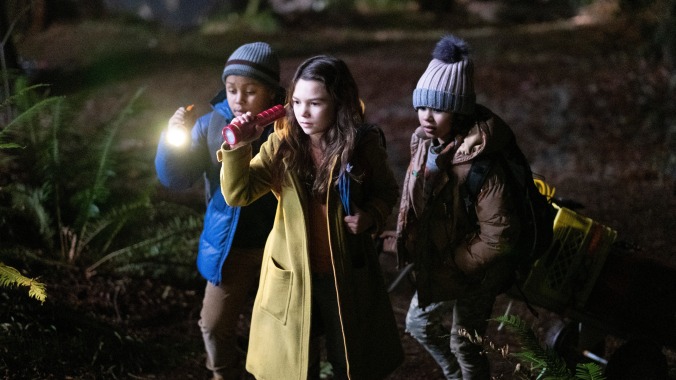The problem is that the show is ultimately outlandish in all the wrong places. It does have the bones of an intriguing mystery: Hilde’s journalist dad Matt Lisko (Jim Sturgess) relocates his family from Brooklyn to the Pacific Northwest hometown of Erie Harbor that he escaped decades ago, but the reasons he’s given to his wife Bridget (Abby Miller from Justified) and their three daughters have been vague. It turns out that he’s been privately tortured by his involvement with Erie Harbor’s most notorious trauma. As a kid, Matt witnessed the abduction of his friend Richie Fife. Authorities pinned the crime on Sam Gillis (Michael Greyeyes), an older indigenous boy. But a body was never recovered, and Matt was ostracized for refusing to believe that Sam committed murder.
The case draws Hilde’s attention because years later, figures from this incident, and Matt’s life in general, basically run the entire town: Richie’s dad Jack (Adrian Hough) is the mayor; Matt’s former squeeze Kim (Joelle Carter, also from Justified) is principal of the school attended by Hilde and her older sister Izzy (Kyle Rogers); Richie and Matt’s old friend Frank (Michael Weston) is a deputy at the sheriff’s department run by his father (Louis Herthum). The Erie Harbor population is filled out with cardboard townspeople who exist only to immediately shun members of the Lisko family over Matt’s age-old troublemaking. They also bristle as Hilde’s young reporter begins publishing her own local-news blog, starting with a neighbor’s mysterious death in the first episode, and then moving on to uncover more details about the Fife case. Her online circulation apparently reaches full saturation almost immediately, including the local school, where 9-year-olds like Hilde and her classmates inexplicably share spaces with weed-vaping teenagers.
The flimsiness of these background details wouldn’t rankle so much with stronger figures in the show’s foreground. Sadly, despite ample screen time for Prince, Hilde spends the entire first season resembling a high concept rather than a person. Like so many child-prodigy narratives, Home Before Dark finds it most expedient to have Hilde act, think, and talk more or less like a miniature adult (albeit with a kid’s stringent sense of right and wrong). Even a child actor as good as Brooklynn Prince can seem stilted and smarmy when handed self-consciously elevated child-genius dialogue. A character like Veronica Mars can at least make “unrealistic” quippiness a window into her personality, sensibility, even her pain. A character like Hilde Lisko isn’t telling us anything about her character except that she’s ridiculously advanced for her age—over and over, with hacky laugh lines.
There are moments where the strange mixture of townie noir and kid-adventure antics do hit a pleasing equilibrium, and even feel truthful, however briefly. When Hilde brings two new friends along to investigate a crime scene, the other kids mostly poke around for their own amusements, eating cookies and watching TV while Hilde does the actual snooping. There’s also a bit of funny interplay between Matt’s late-’80s past and his daughters’ contemporary sensibilities; as savvy as Hilde is, she’s absolutely baffled by the early appearance of a VCR (then again, the writers seem to be relying on secondhand knowledge there, too. Since when do VCRs spark and smoke when fed a slightly damaged cassette?).
Home Before Dark moves swiftly, with network-style running times for its ten episodes. In fact, there’s hardly anything here in terms of style and content that couldn’t work on CBS or NBC. That’s not necessarily a bad thing, but after a while the show starts to feel like a rejected pilot that somehow strung itself out into a full series. For every mildly enjoyable flourish, like a neat series of flashbacks where older characters are placed in past environments to “observe” their younger selves, there’s a stylistic tic like the brief passages of collage-style animation that don’t have much to do with anything beyond the show’s tired conception of reporting and crime-solving. Of course, that conception involves extremely cinematic art-project/vision-board notes with incisive questions like “who killed Richie Fife??” scrawled onto post-its. Hilde may be a child genius, but she still thinks like an overbusy props department.
Considering that Home Before Dark is, for the most part, terribly written on a scene-to-scene level, its central mystery does offer a compelling baseline for the season. By the time the season finale rolls around, binge viewers may be excited to find out how the loose ends tie up—and disappointed to find themselves on the hook for another season (already ordered, naturally). It’s hard not to think again of Veronica Mars, where season-long mysteries could offer narrative catharsis (not to mention some standalone side stories) while still leaving characters’ fates open-ended. It doesn’t give too much away to say that Home Before Dark does the opposite: The characters’ trajectories are easy to predict by around the halfway mark, if not earlier, but the narratively is shamelessly unresolved. The weight that tugs at the story isn’t thematic heft; it’s the self-made burden of a network-style show that stubbornly refuses to find worthwhile resolution.












![Rob Reiner's son booked for murder amid homicide investigation [Updated]](https://img.pastemagazine.com/wp-content/avuploads/2025/12/15131025/MixCollage-15-Dec-2025-01-10-PM-9121.jpg)

























![HBO teases new Euphoria, Larry David, and much more in 2026 sizzle reel [Updated]](https://img.pastemagazine.com/wp-content/avuploads/2025/12/12100344/MixCollage-12-Dec-2025-09-56-AM-9137.jpg)



